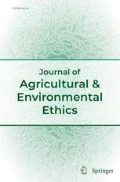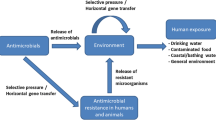Abstract
The issue of regularly feeding low levels of antibiotics to farm animals in order to increase productivity is often portrayed as a dilemma. On the one hand, such antibiotic use is depicted as a necessary condition for producing cheap and plentiful food, such that were such use to stop, food prices would rise significantly and our ability to feed people in developing nations would decrease. On the other hand, such antibiotic use seems to breed antibiotic resistance into pathogens affecting human health. Resolving this dilemma, it is alleged, will require great amounts of research into risk/benefit assessment. Contrary to this claim, we will argue that society has all the data it needs to make a reasonable ethical decision, which would be curtailing such use. Such curtailment will not harm consumers significantly, will not harm developing nations' evolving agriculture, and could produce hitherto unnoticed benefits, namely restoring the possibility of a more husbandry-based, sustainable agriculture to replace the high-tech agriculture that has hurt animals, the environment, small farms, and sustainability.
Similar content being viewed by others
Author information
Authors and Affiliations
Rights and permissions
About this article
Cite this article
Rollin, B. Ethics, Science, and Antimicrobial Resistance. Journal of Agricultural and Environmental Ethics 14, 29–37 (2001). https://doi.org/10.1023/A:1011315022587
Issue Date:
DOI: https://doi.org/10.1023/A:1011315022587




